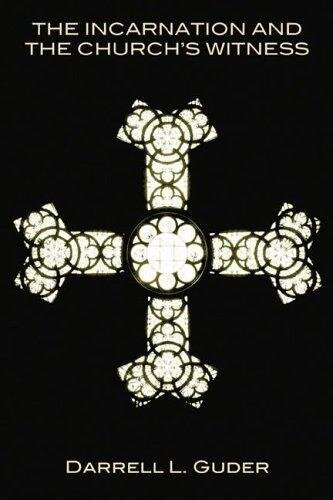Darrell Guder, The Incarnation and the Church’s Witness. Wipf and Stock Publishers, 2005.
Referenced in: Theology of Mission
LifeandLeadership.com Summary
Guder elevates the incarnation as the most helpful model for the church as it conceives of its mission. This excerpt expresses his thesis:
“By incarnational mission I mean the understanding and practice of Christian witness that is rooted in and shaped by the life, ministry, suffering, death, and resurrection of Jesus. The critical question that motivates this study is this: Can and should the unique event of the incarnation of Jesus that constitutes and defines the message and mission of the church have concrete significance for the way in which the church communicates that message and carries out the mission?
Understanding mission incarnationally … could prove to be a remarkably integrative way to approach the church’s missionary vocation. It could counter the typically Western reduction of mission to one of the many programs of the church. It could recast that mission as the definitive calling of the church. It could seek to read the biblical record in its own terms and to address serious problems in Western mission that have surfaced in this century.
Thus, the language of incarnational mission could be both constructive with regard to the biblical and theological understanding of message, and polemical with regard to the context and history of mission, especially in the Western tradition.
Just as any theological concept is susceptible to distortion, there are ways of misconstruing the linkage of Christian mission with the incarnation. It is possible to dilute the uniqueness and centrality of the life, death, and resurrection of Jesus Christ when his incarnation becomes a model for Christian behavior. A primary ethical or moralistic interpretation of the life of Jesus, such as was characteristic of nineteenth-century liberal theology, often downplays or dilutes the event-character of the gospel.
But it is that event character, the historical ‘happenedness’ of Jesus’ life, that both enables and defines Christian witness. As we seek to explore the missional significance of the incarnation, we need to resist every temptation to dilute the centrality of the incarnation event. The risk represented by the concept of incarnational mission is worth taking, I think, especially as we are challenged to develop a viable mission theology for the Western world, which by common consent is now a very challenging mission field.
The case for an incarnational approach to missional witness is based, on the one hand, on the character of the biblical record; that is, the way in which the church’s missionary vocation is shaped by the earthly ministry of Jesus. The emphasis upon the necessary congruence of witness is rooted in God’s way of revealing himself supremely and finally in the incarnation of Jesus. The comprehensiveness of the biblical understanding of witness calls for an incarnational interpretation.
On the other hand, this approach helps us deal with some serious problems in our particular Western context. We see in both our mission history and our current evangelistic practices so much that is contrary to the incarnational character of the gospel. We see a gospel of peace proclaimed in divisive, judgmental ways. We see a Gospel of love conveyed manipulatively, insensitively, condescendingly. We see a gospel of healing obscured by distortions that hurt people and evoke resentment.
Thus we arrive at the concept of incarnational witness as one way of expounding the character of our missionary vocation. In the incarnation of Jesus Christ, God revealed himself as the One who is with and for his creation.
Now, as the Risen Lord sends his Spirit to empower the church, we are called to become God’s people present in the world, with and for the world, like St. John pointing always to Christ. The most incarnational dimension of our witness is defined by the cross itself, as we experience with Jesus that bearing his cross transforms our suffering into witness.
Incarnational witness is, therefore, a way of describing Christian vocation in terms of Jesus Christ as the messenger, the message, and the model for all who follow after him. To speak of the incarnation missionally is to link who Jesus was, what Jesus did, and how he did it, in one great event that defines all that it means to be Christian.”
From the Publisher
For several years, argues Guder, contemporary Christian churches have often thought of their mission efforts as simply one more program of the church. In addition, outsiders have rightly criticized Christian mission efforts as exercises in cultural imperialism.
In this provocative book, Guder argues that the incarnation of God in Jesus provides the foundational model for the practice of Christian missions in the world today. The incarnation is the culmination of God’s activity and presence in the world, says Guder, for in this event God initiates the healing of a broken world.
Using literary, historical, and social approaches to scripture, Guder claims the contemporary church should return to an “incarnational mission” in which the practice of Christian witness is “shaped by the life, ministry, suffering, death, and resurrection of Jesus.”
About the Author
Darrell Guder was appointed to the Henry Winters Luce Chair of Missional and Ecumenical Theology in January 2002 at Princeton Theological Seminary, where he challenges the church to reclaim its missionary spirit. The California native earned his Ph.D. in Hamburg, Germany, and was a youth pastor and college professor there. He also directed the Institute of Youth Ministries of Fuller Seminary and Young Life and was academic dean of Whitworth College.
***For additional information on this resource, including reviews, click the bookstore links. Check the reference at page top or the links below for resource guides on related topics.***
See Resources on Over 100 Areas of Ministry Leadership:


